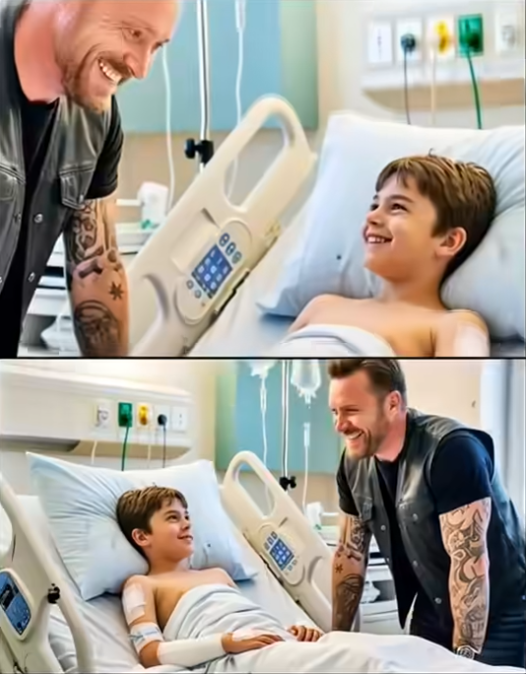
The rain fell hard that night, pounding on the cracked sidewalks and running down the alleys like veins of cold light. Sixteen-year-old Eli sat behind a closed diner, knees pulled tight against his chest, his jacket soaked through. The city moved past him without a glance — another invisible kid swallowed by the night.
He hadn’t eaten for two days. His mother had died when he was fourteen, and his father, broken by grief and addiction, disappeared soon after. Since then, Eli had survived by scavenging, sleeping under bridges, and taking odd jobs to live. Life had taught him not to expect kindness — but it hadn’t managed to kill it inside him.
That night, fate was about to test that stubborn spark.
Eli heard shouting coming from the alley behind a nearby bar. He peeked around the corner and saw three men surrounding someone — a big man in a leather jacket, tattoos running down his arms, the words Hells Angels stitched across his back. The man looked older, tired, cornered. The three punks were drunk and mean, circling him like wolves.
“Walk away, old man,” one sneered.
“I’m trying,” the biker growled, but they pushed him again, laughing. One of them picked up a metal pipe.
Eli froze. He had seen fights before. Usually, he looked away. But this time, something inside him wouldn’t allow it.
When the pipe swung down, Eli didn’t think — he ran.
The crack of metal hitting flesh echoed in the rain, followed by the sick sound of fists. But it wasn’t the biker who took the hit. It was Eli.
“Stop!” he yelled, throwing himself between them. “He didn’t do anything!”
The men turned on him, shouting, shoving him to the ground. The biker tried to pull them off, but they were too many. Eli curled into a ball, taking the blows until he could barely breathe. Then, somewhere in the distance, police sirens wailed. The attackers scattered into the dark.
When Eli opened his eyes again, everything hurt. The biker knelt beside him, rainwater and blood mixing on the pavement. “Why did you do that, kid?” he asked quietly.
Eli managed to whisper, “Nobody deserves to be hurt like that.”
Then the world went black.
He woke up in a hospital bed, the steady beep of machines beside him. For a moment, he thought it was a dream — until he saw the biker sitting at his bedside, still wearing that leather jacket.
“You’re awake,” the man said. “Name’s Ray. You saved my life out there.”
Over the next few days, Ray stayed. He brought food, sat quietly through the long hours, and learned Eli’s story piece by piece — the streets, the hunger, the loss. The hardened biker, who had spent decades on the road and in trouble, felt something change inside him. He saw a kid who still had decency in a world that had given him none.
When Eli was discharged, Ray refused to let him go back to the streets.
He took him home — a small garage on the edge of town, walls lined with tools and half-built motorcycles. It wasn’t much, but it was safe. For the first time in years, Eli slept in a bed, ate warm food, and woke up to someone asking how he felt.
Ray was rough around the edges, but there was kindness in his gruff voice. He put Eli to work around the garage — cleaning parts, fetching tools, learning how engines came apart and fit back together again.
Weeks passed. Then, one morning, a local reporter showed up. Someone had heard about “the street kid who saved a Hells Angel.” Ray tried to turn her away, but the story spread anyway. Within days, it was known all over town.
The photo of Eli — small, bruised, standing beside the towering biker — went viral. People called him a hero. Donations to homeless shelters poured in. Schools organized food drives. The town that had ignored him for years suddenly couldn’t stop talking about him.
But fame has two sides. Some locals said it was only for attention. Others sneered, saying a “street kid” didn’t deserve sympathy. Eli heard it all. He kept his head down, walking home from school (Ray had insisted he enroll again) with the quiet dignity of someone used to being judged.
When he told Ray about it, the older man just shrugged. “Let them talk, kid,” he said. “What matters is who you are when nobody is watching.”
A few weeks later, Ray got a phone call. He listened, nodded once, and said only, “We’re going for a ride.”
They drove out to an open field just outside town. As they crested the hill, Eli froze. The field was filled with motorcycles — hundreds of them, engines rumbling like distant thunder. Men and women in leather vests stood waiting, the Hells Angels emblem glinting in the sun.
Ray rested a hand on his shoulder. “Word got around,” he said. “About what you did. They came to see you.”
Eli stepped out of the truck. The noise dropped to silence. Then one by one, the bikers removed their helmets.
The chapter leader, a mountain of a man with gray hair and weathered eyes, stepped forward. “This kid,” he said, pointing to Eli, “did what most grown men wouldn’t. He put himself in harm’s way for one of us. That kind of courage deserves respect.”
Then he did something sacred — he took off his vest, the patch every Angel earns through loyalty and brotherhood, and placed it over Eli’s shoulders.
“From now on,” he said quietly, “you’re family.”
Tears filled Eli’s eyes. The crowd erupted as every biker started their engines, the roar rising into a deafening storm of sound. The ground shook beneath their boots. It was a salute — the loudest, purest show of honor they knew.
The story spread nationwide. Donations for Eli’s education flooded in. Homeless shelters received record support. For once, people didn’t just talk about kindness — they acted on it.
Months later, Eli started school again, wearing that leather vest proudly over his jacket. It wasn’t rebellion anymore — it was belonging. A symbol of the family he had found when he had none.
Ray watched from a distance, arms crossed, a small smile hidden in his beard. He had found something too — redemption.
Years passed. Eli grew stronger, taller. He worked part-time at Ray’s garage and volunteered at shelters, helping kids like the one he used to be. When he turned eighteen, the mayor invited him to speak at a community event. Standing before hundreds of people, his voice shook but his message was clear: “You don’t need much to change a life. Just the courage to care.”
That night, he and Ray rode down the highway together, side by side, the stars spread wide above them. For the first time in years, Eli felt whole. The wind against his face wasn’t cold anymore — it was freedom.
He wasn’t a homeless boy anymore. He was part of a family.
And as the engines thundered through the night, people came out of their homes to watch — old men tipping their hats, mothers holding their children close.
Somewhere in that sea of headlights, Eli smiled through his tears. Because he knew now that even the smallest act of courage could change everything.
In that small town, forever changed by one boy’s heart, the sound of engines became the sound of hope.
